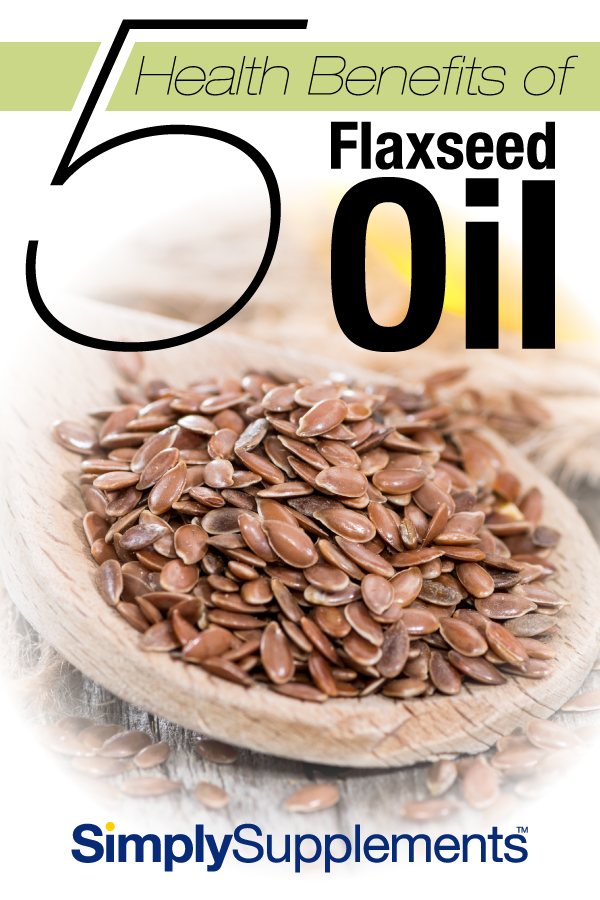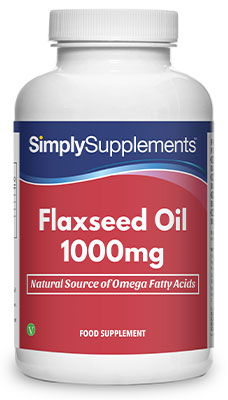Health Benefits of Flaxseed Oil

Flaxseed is also sometimes known as linseed. This reasonably unassuming-looking plant, with its sky-blue flowers, would be all too easy to overlook were it not for all the many benefits that it offers.
Perhaps this helps to explain why humans have been cultivating this incredible plant for millennia, and why these days ever more of us are taking a flaxseed oil supplement for our health...
What is Flax?
Flax, also known by the Latin name of Linum usitatissimum, is a member of the Linum family and is easily recognisable for its tall slender stems, while the fruits are round, dry capsules that contain golden/brown seeds. Fibres taken from the stems are spun into linen, while the seeds have many culinary uses.
The cultivation of flax was common practice by 4000 BC in regions of Asia and those bordering the Mediterranean Sea. In Ancient Egypt, flax was considered a sign of purity and linen was spun to clothe pharaohs and priests and to entomb mummies. Egyptian linen was also traded across the Mediterranean for the production of sails and textiles.
What Makes Flaxseed Oil So Beneficial?
Flaxseed oil is a potent plant-derived cocktail that contains a range of different components, each of which seems to offer health-giving benefits. The most important of these are:
Alpha Linoleic Acid (ALA)
Around 50% to 60% of each seed is made up of an omega 3 oil called alpha-linolenic acid (ALA), which is responsible for many of its health benefits.
While ALA in itself has health benefits, its greatest impact tends to stem from what the body can turn ALA into. Traditionally ALA has been seen as a precursor to two polyunsaturated fatty acids (PUFAs) known as Docosahexaenoic Acid (DHA) and Eicosapentaenoic Acid (EPA). These are the same fatty acids found in fish oils, which help to provide a wealth of different health benefits.
More recent analysis, however, suggests that the picture may not be quite so clear. For example, a group of women were provided with a flaxseed oil supplement for four weeks. After the experiment blood samples were taken to assess increases in the volumes of both EPA and DHA. Interestingly the experts found that the ALA led to increases in EPA “but had no effect on… DHA contents”.
As a result, current beliefs in the scientific community are that flaxseed oil may only result in increased EPA levels, though this fatty acid alone offers a plethora of benefits.
Lignans
Lignans are a group of polyphenols believed to offer antioxidant benefits. However, lignans also belong to a group of chemicals known as “phytoestrogens” that mimic the activity of oestrogen in the body. Flaxseeds are thought to be the number one plant source of lignans. In fact, they contain 7 times as many lignans as sesame seeds and over 300 times more than sunflower seeds.
Dietary Fibre
Being rich in fibre, flaxseeds (and flaxseed oil) can also help to support a healthy digestive system and to control glucose balance within the body.
What are the Health Benefits of Flaxseed Oil?
Flaxseeds are variously referred to as a “superfood” or a “functional food” because alongside the provision of macronutrients they also offer a wide range of health benefits, often derived from their ALA content. Here are some of the more exciting benefits that flaxseeds and flaxseed oil seem to offer…
Cardiovascular Protection
Omega 3 fatty acids have long been known to help protect the body from cardiovascular disease; currently one of the biggest sources of mortality in western nations. As flaxseed oil is rich in ALA, which the body can turn into these beneficial long-chain fatty acids, it so follows that flax may offer protection against cardiovascular conditions.
This certainly seems to be borne out by recent research. For example, studies have found that individuals that enjoy a higher intake of ALA tend to be less likely to suffer from atherosclerosis and - by extension - strokes and heart attacks.
Scientific studies have also found that the regular consumption of flaxseed can benefit cholesterol levels in the body. Extensive research indicates that total cholesterol tends to fall by 6-11%, while LDL (bad) cholesterol typically reduces by between 9% and 18% when individuals regularly consume flaxseeds or flaxseed oil.
Elsewhere, scientists compared the impact of flaxseed and sunflower seeds on cardiovascular risk factors. The key to understand here is that while flaxseed oil’s main omega 3 content comes in the form of alpha linoleic acid, sunflowers are rich in other fatty acids. After 23 days of supplementation it was found that EPA levels more than doubled in the flaxseed group while remaining unchanged in the sunflower seed volunteers. This increase in EPA is considered to be an indication of its cardioprotective properties, with the scientists summarizing that “consumption of alpha linoleic acid-rich oils [like flaxseed oil] may offer protective effects against cardiovascular disease”.
Joint Pain Relief
Many of us suffer with degenerating joints as a result of the natural ageing process. It has long been believed that omega 3 fatty acids, such as those produced by the body using building blocks from flaxseed oil, help to reduce inflammation. As a result they may reduce problems such as joint discomfort and reduced flexibility.
A study aiming to identify exactly how polyunsaturated fatty acids help to ease joint pain found that they seem to act in at least two manners. Firstly, they help to suppress proteins in the body known as “cytokines” that act as “messengers” and encourage an inflammatory response. Secondly, omega 3 oils seem to also suppress enzymes known as “proteases” which are responsible for the physical breakdown of joint cartilage. In doing so, omega oils like EPA help to slow the progression of degenerative joint conditions.
It is also interesting to highlight that when comparing the impacts of different omega 3 oils, experts found that “EPA was more effective than DHA”. This is reassuring because, as previously discussed; it is EPA levels that tend to rise most significantly after consumption of flaxseed oil.
Another study provided existing rheumatoid arthritis sufferers with either 1.8 grams of EPA per day or a placebo tablet to measure any impact on their condition. After 12 weeks of ongoing supplementation the EPA group saw measurable improvements in “morning stiffness and number of tender joints”. Just as interestingly, once the experiment ceased and the EPA group stopped taking their supplement they began to “deteriorate significantly”, suggesting that ongoing consumption is crucial for long-term protection.
Current research suggests that fatty acids like those derived from flaxseed oil aren’t just useful for treating pre-existing conditions; they may even help to reduce the onset of such symptoms in the first place.
A fascinating study asked 32,232 women born between 1914 and 1948 to complete a questionnaire outlining their diet, and hence their average intake of beneficial omega 3 oils. After seven years the scientists compared the results of those that had been unlucky enough to contract rheumatoid arthritis in the meantime with comparable healthy participants. They found that a long term intake of long-chain omega 3 oils higher than 0.21 grams per day “was associated with a 52% decreased risk” of developing rheumatoid arthritis.
Protection from Cancer
Recent research has suggested that alpha linoleic acid (ALA) may help to protect the body from a number of different cancers.
For example, it has been indicated by past studies that omega 3 fatty acids such as those in flaxseed oil may have a protective impact when it comes to tumour cell proliferation, while omega 6 oils can have quite the opposite impact.
In one study these two fatty acid groups were pitted head-to-head. Colon tumour cells were either treated with flaxseed oil (high in omega 3 acids) or corn oil (high in omega 6). The tumours were then left to grow before measurements were taken. The finds are startling; while the cells receiving high levels of omega 6 oil grew by 44.4mm on average, the flaxseed group saw growth of just 5.3mm. This suggests that the active ingredients in flaxseed oil do indeed have very beneficial impacts on retarding the growth of some cancers.
Indeed, the lab-based results have been so positive that scientists have more recently begun supplementing human patients with flaxseed oil in order to observe the impact. The latest research suggests that 25 grams of flaxseed oil per day “reduces tumour growth in breast cancer patients” and furthermore that 50mg of lignans per day “reduces risk in premenopausal women”.
The consumption of flaxseed doesn’t necessarily have to involve crunching your way through bowlfuls of raw seeds however. In another study, flaxseed was instead used as a baking ingredient to create muffins. Breast cancer patients were provided with either flaxseed muffins or placebo muffins containing no active ingredients for a period of up to 39 days.
During this “treatment” process blood tests were taken. Samples were monitored for a well-established chemical trace known to experts as “Ki67” that indicates tumour cell growth. The scientists found that simply enjoying a flaxseed muffin each day reduced the levels of Ki67 by 34.2%, while no changes were observed in the placebo group.
There is another interesting finding that makes flaxseed oil even more appealing. Many naturally-occurring nutrients can actually interfere with contemporary cancer treatments such as Tamoxifen (TAM). Flaxseed oil, however, seems to have quite the opposite impact, and actually may provide synergistic benefits. This effect seems to be particularly strong in cases of breast cancer.
In one study, tumour cells were treated either with tamoxifen alone, or with a cocktail of both tamoxifen and flaxseed oil combined. The results showed that flaxseed oil had “the greatest effect” when “compared to TAM treatment alone”. Interestingly it isn’t just tamoxifen that seems to be positively impacted by flaxseed oil; other well-established drug therapies such as Herceptin have also shown similar effectiveness.
Mood
It has been suggested in the past that fish oils may offer benefits to mood, such as in cases of depression and even personality disorders. While the science to date has looked promising, most studies lump together DHA and EPA in fish oils as though they were one and the same - which they most certainly are not.
Furthermore, as discussed previously, it seems that flaxseed oil leads to far greater increases in EPA levels than DHA. The question therefore follows as to which of these two PUFAs are actually having the positive impact regularly noted?
A study was designed to address this exact query. The scientists in question gathered together the results of 28 different, well-designed past studies, and pooled the results to assess which omega 3 oil is likely to be most beneficial. After serious analysis they concluded that “EPA may be more efficacious than DHA in treating depression”. It therefore logically follows that a regular consumption of flaxseed oil may help to improve mood in those individuals who are unlucky enough to suffer from such complaints.
Healthy Digestion
One study provided participants with 50 grams of flaxseed oil per day for a period of 4 weeks while asking them to keep all other factors constant. The goal of this study was to assess a wide range of different markers of health. However, alongside the anticipated improvements in a range of health conditions, the scientists also noted that bowel movements increased by 30% in volunteers. It seems that the high levels of dietary fibre found within flaxseed therefore have the potential to improve digestion and reduce the incidence of constipation.
Other studies since then have investigated the potential benefits of flaxseed oil on the management of glucose absorption from food. This is of great interest for a number of reasons. Firstly, regular significant spikes in blood sugar are considered to be a major risk factor for Type II diabetes. Secondly, these “spikes” tend to be rapidly followed by a trough, resulting in feelings of tiredness.
Finally, for a nation whose obesity problems only seem to be growing, a better understanding of how the body absorbs glucose from the diet has the potential to assist with natural and safe methodologies for losing excess body fat. Studies have found that the same dietary fibres that can lead to increased bowel movements may also help to reduce glucose absorption after eating.
How to Use Flaxseeds
Flaxseeds aren’t particularly flavoursome, so it can be tricky to find creative ways to add these seeds to your meals. Whole flaxseeds can be added to breakfasts, salads or soups to give a little extra crunch. In ground form, the mild nutty taste can add something a little different to bread or cake recipes, and still retains its beneficial ALA content. When storing, whole flaxseeds can be kept in an air-tight container for several months, while ground flaxseed should be consumed within a couple of weeks.
Alternatively, many people opt to take a flaxseed oil supplement, which offers all the benefits without the trouble of having to try and factor these seeds into your diet.
How Much Flaxseed Oil Should I Take?
Flaxseed oil supplements became particularly popular as viable alternatives to fish oils for omega 3. However, because the omega 3’s in flaxseed aren’t absorbed by the body as easily as the omega 3’s in fish oils, higher quantities need to be consumed for the same health benefits. The doses used in clinical trials suggest that the optimum dose lies somewhere between 1500mg to 5000mg (1 to 2 tablespoons) of flaxseed oil per day, and you should look for an ALA content of at least 200mg. Ideally, flaxseed oil should be taken with food to improve the absorption of the oil and reduce the risk of any side effects.
Flaxseed oil is often sealed in soft gel capsules to protect against damage from heat, air and light, and to prevent rancidity. The soft-gel capsules are available in gelatin and non-gelatin varieties so don’t assume all flaxseed oil supplements are safe for vegetarians. Be sure to check before you purchase.
Side Effects and Interactions
Flaxseed Oil is generally considered safe but if you are taking any other supplements on a regular basis it is best to consult your doctor before you start using flaxseed. It can act as a blood thinner and so may interact with anticoagulant medications.
Flaxseed or flaxseed oil is not recommended for children or women who are pregnant or breastfeeding and should be used with caution by women with hormone-sensitive breast or uterine cancer.
Shop for Flaxseed Oil Supplements here.

Sources:
http://www.sciencedirect.com/science/article/pii/S0140673685920240
https://link.springer.com/article/10.1007%2FBF00262088?LI=true
http://www.sciencedirect.com/science/article/pii/S1471489213000180
http://ard.bmj.com/content/73/11/1949.short
http://www.sciencedirect.com/science/article/pii/S0952327810000529
https://link.springer.com/article/10.2165/00003495-200565080-00002
http://www.tandfonline.com/doi/abs/10.1080/07315724.2009.10719785
http://ajcn.nutrition.org/content/83/6/S1526.short
http://ajcn.nutrition.org/content/88/3/801.short
http://jn.nutrition.org/content/136/1/83.short
http://ajcn.nutrition.org/content/77/1/226.short
http://clincancerres.aacrjournals.org/content/11/10/3828.short
http://onlinelibrary.wiley.com/doi/10.1111/j.1753-4887.2004.tb00002.x/full
http://www.tandfonline.com/doi/abs/10.1207/S15327914NC432_9
http://www.nrcresearchpress.com/doi/abs/10.1139/apnm-2013-0420#.WmB54ahl8dU
http://onlinelibrary.wiley.com/doi/10.1002/mnfr.200900068/full
http://www.tandfonline.com/doi/abs/10.1207/s15327914nc5402_8
http://ajcn.nutrition.org/content/61/1/62.short
http://www.nrcresearchpress.com/doi/abs/10.1139/H09-087#.WmB5Hqhl8dU
http://www.nchpjournals.com/manuscript/uploads/article_890.pdf
http://jn.nutrition.org/content/139/10/1890.short

 Nicole
Nicole 

























